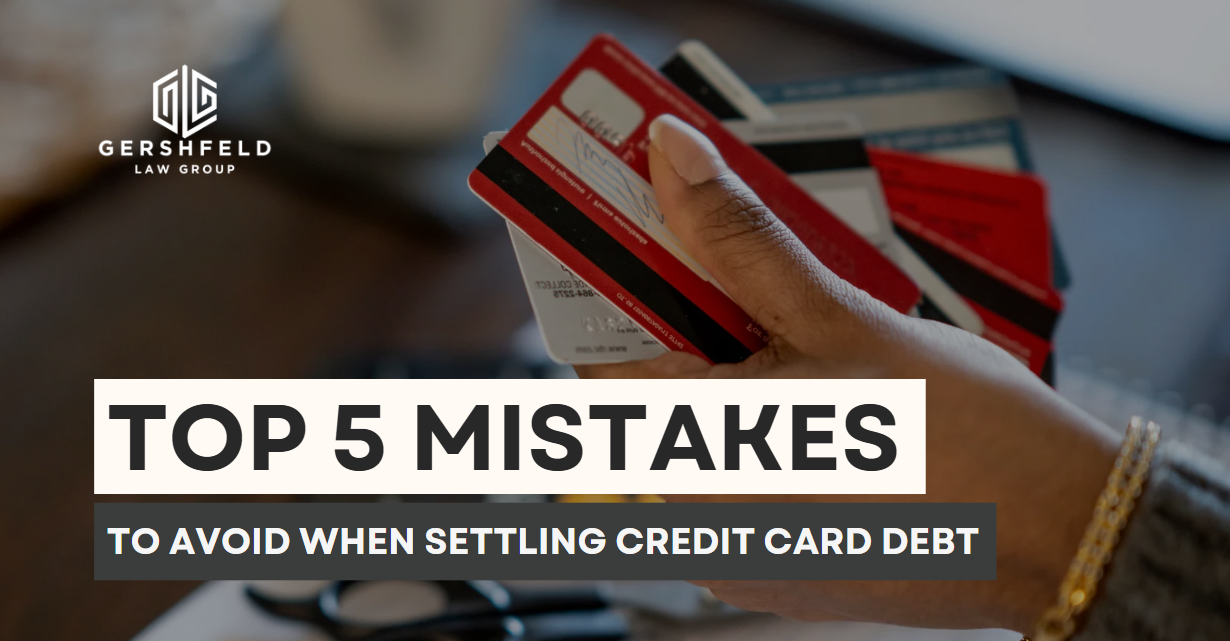If you’re struggling with credit card debt, debt settlement can offer a real path to relief—but only if it’s done right. At Gershfeld Law Group, we’ve seen too many people fall into traps that cost them more time, money, and stress than necessary. Settling debt isn’t just about paying less—it’s about doing it smartly and legally.
Before you take the plunge, learn the top 5 mistakes to avoid when settling credit card debt so you can move forward with confidence and clarity.
1. Settling Too Early Without Exploring All Options
When you’re overwhelmed with debt, it’s tempting to jump at the first settlement offer just to make it go away. But rushing the process can backfire. Creditors may offer better deals if accounts are already delinquent or if you show financial hardship documentation.
Debt settlement tips: Always take time to understand your full financial picture. Consult with a professional to see if negotiation makes sense now, or if waiting could lead to a better outcome. Don’t rush into a deal you’ll regret later.
2. Trusting Verbal Agreements
One of the most dangerous credit card debt settlement errors is trusting a deal made over the phone without anything in writing. Creditors may say they’ll forgive a portion of your debt if you pay a certain amount, but if it’s not documented, you’re risking future legal or financial trouble.
How to settle debt smartly: Always demand a written agreement before making any payment. It should clearly state the amount to be paid, the forgiven balance, and that your account will be marked as “settled” or “paid in full.”
3. Working with Shady or Unlicensed Companies
Unfortunately, debt relief scams are common. Many companies promise to wipe out your debt quickly or guarantee results, but then charge large upfront fees and vanish before delivering anything. In some cases, they can actually worsen your credit or get you sued.
Tip: Do your homework. Work only with licensed professionals or law firms like Gershfeld Law Group, who are legally bound to act in your best interest. Be wary of aggressive sales tactics or companies that ask for money before services are performed.
4. Failing to Consider the Tax Implications
Did you know that forgiven debt could be considered taxable income? If you settle $10,000 in credit card debt for $5,000, the forgiven $5,000 might be taxed unless you qualify for an exception (like insolvency).
Debt settlement tips: Always talk to a tax professional about how a settlement could impact your taxes. Planning ahead can help you avoid an unexpected tax bill.
5. Not Getting Professional Help
Many people attempt to settle debt on their own, and while it’s possible, it’s also risky. Creditors are experienced negotiators, and if you don’t know how to push back or present your hardship effectively, you may not get the best deal. Worse, you could agree to terms that aren’t enforceable.
How to settle debt smartly: Partnering with experienced professionals like Gershfeld Law Group can make all the difference. We know the law, we know how creditors operate, and we’re here to fight for the best outcome on your behalf.
Avoid Costly Mistakes—Settle Debt the Right Way
Debt settlement can be a powerful tool for financial freedom—but only if you avoid the pitfalls. By understanding these common mistakes when settling credit card debt, you can protect yourself from scams, bad deals, and legal trouble.
If you’re considering settling your credit card debt, don’t go it alone. Gershfeld Law Group is here to guide you every step of the way. From reviewing your options to negotiating on your behalf, our legal team is committed to helping you settle smart, safely, and legally.
Contact us today for a free consultation—and take the first step toward real, lasting relief.









